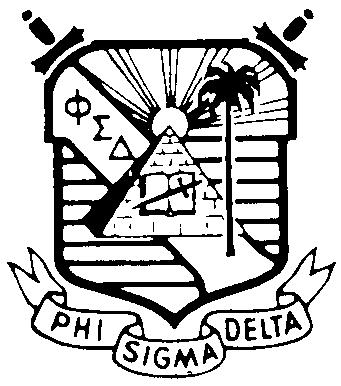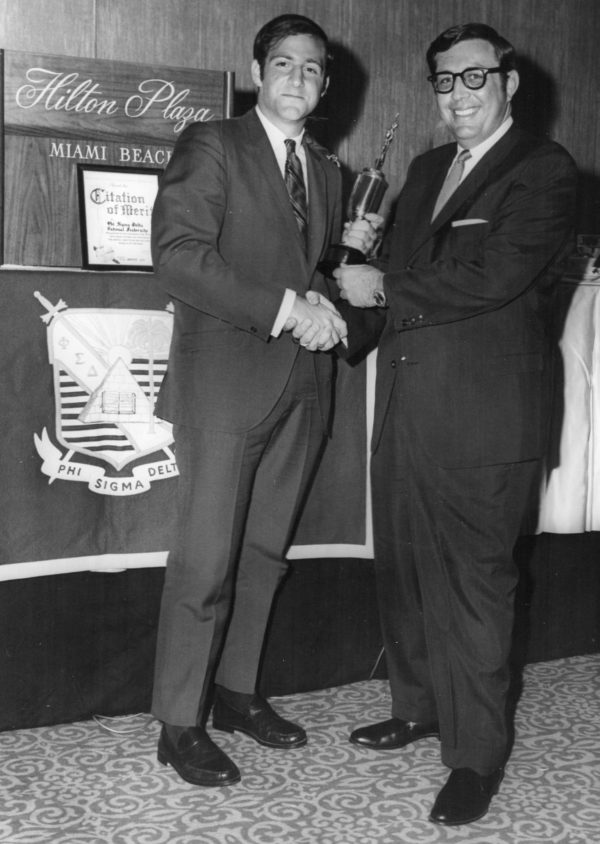Phi Sigma Delta
 To eight students at Columbia University in 1909, there was no fraternity on the campus that was sufficiently attractive to induce a desire for affiliation. These friends agreed that they should organize a fraternity to perpetuate and nurture the comradeship of the group. Alfred H. Iason, William L. Berk, Herbert L. Eisenberg, Joseph Levy, Herbert K. Minsky, Joseph Shalleck, Robert Shapiro and Maxwell Hyman met at the latter’s home at 22 Mount Morris Park West, New York, and Phi Sigma Delta was born on November 10, 1909.
To eight students at Columbia University in 1909, there was no fraternity on the campus that was sufficiently attractive to induce a desire for affiliation. These friends agreed that they should organize a fraternity to perpetuate and nurture the comradeship of the group. Alfred H. Iason, William L. Berk, Herbert L. Eisenberg, Joseph Levy, Herbert K. Minsky, Joseph Shalleck, Robert Shapiro and Maxwell Hyman met at the latter’s home at 22 Mount Morris Park West, New York, and Phi Sigma Delta was born on November 10, 1909.
Meetings were held weekly at the homes of the various brothers, and the constitution, ritual and design of the badge were completed. The first initiate was inducted early in 1911 and the fratres, cognizant of the prospective expansion, established a chapter home in two rooms of Hartley Hall dormitory in September of that year. The chapter became stronger and had 12 members when it was incorporated in the State of New York on June 1, 1912. External expansion was under consideration.
Circumstances at Cornell made it quite easy to enroll men subscribing to the ideals of the Fraternity and as the second chapter came into existence, a need for a central organization became evident. The Central Council had grown to such an extent that a Central Headquarters had to be established in the Times Building in New York. As time moved on, administrative efficiency was increased and headquarters moved to 13 Astor Place, New York. At this time, officers’ terms were increased to two years and a Life Endowment Fund was established for the general maintenance of the Fraternity and a solicitations campaign followed.
A full-time stenographer was employed in 1926, a new and accurate filing system was established and the work of the Executive Secretary was generally supplemented.
Stanford Zucker, Omicron, made an extended trip in 1927 as Traveling Secretary, visiting nine chapters. The constitution was amended creating the Executive Council which included the officers, members-at-large and chairmen of the External and Internal Committees.
Under the presidency of Joseph Kruger in 1932, the Constitution was completely revised and the Executive Council was enlarged to 13 members to further strengthen administration.
In 1934, Phi Sigma Delta pioneered the German student refugee program. The Jewish Students Scholarship Fund was established in Chicago under the direction of Arnold Shure, Mu, to help bring young men from under the Nazi heel to this country. Chapter houses offered a place to sleep and eat so that these young men would be able to continue their education.
During World War II, fraternity progress was at a standstill and 14 chapters continued to function despite difficulties and lack of full membership. National conventions were called off for the duration while nearly 2,000 Phi Sigs were serving in the armed forces.
difficulties and lack of full membership. National conventions were called off for the duration while nearly 2,000 Phi Sigs were serving in the armed forces.
Regular Conventions resumed in 1946 in Chicago and Joe Kruger resumed his posts as Executive Secretaryand Editor. The first full-time Field Secretary, Alexander Lewin, was also employed this year. The War Fund, established in honor of the war dead under the guidance of Ted Rich, reached better than $10,000 and each chapter was given a beautiful Memorial Scholarship Plaque on which the names of those from the chapter who had been killed were listed with additional space being provided for honoring the outstanding undergraduate scholar in the chapter each year.
In 1947 the first National Chaplain, appointed that year, was Rabbi Leon Feuer, Kappa. In 1948, the Convention was held at Denver and the office of a second vice president was established. The following year saw the celebration of the Fraternity’s 40th year of existence and the Ruby Anniversary was held in New York.
In April 1959, Phi Alpha fraternity, a national fraternity quite similar in character to Phi Sigma Delta, merged with the latter, having a total membership of approximately 17,000 members and 47 active chapters.
| Chapter | University |
|---|---|
| Alpha | Columbia University |
| Alpha Alpha | University of Connecticut |
| Alpha Beta | University of California-Los Angeles |
| Alpha Delta | Ohio University |
| Alpha Epsilon | Syracuse University |
| Alpha Gamma | University of Illinois at Urbana-Champaign |
| Alpha Lambda | University of Detroit-Mercy |
| Alpha Mu | University of Massachusetts-Amherst |
| Alpha Nu | University of Wisconsin-Milwaukee |
| Alpha Omicron | Pratt Institute |
| Alpha Phi | Parsons College |
| Alpha Rho | Washington University |
| Alpha Sigma | Michigan State University |
| Alpha Tau | Long Island University |
| Alpha Theta | Rutgers State University of New Jersey |
| Alpha Upsilon | Adelphi University |
| Alpha Xi | Long Island University-C.W. Post |
| Beta | Cornell University |
| Chi | Duke University |
| Chi Mu | New York University |
| Delta | New York University |
| Epsilon | University of Maryland - College Park |
| Epsilon | Union College |
| Eta | University of Michigan |
| Gamma | Rensselaer Polytechnic Institute |
| Iota | University of Denver |
| Kappa | Case Western Reserve University |
| Kappa Nu | Brooklyn College |
| Lambda | University of Texas at Austin |
| Mu | University of Chicago |
| Nu | Massachusetts Institute of Technology |
| Omega | University of Missouri |
| Omicron | The Ohio State University |
| Phi | University of Vermont |
| Phi Alpha Mu | City College of New York |
| Pi | University of Wisconsin-Madison |
| Psi | University of Alabama |
| Rho | Johns Hopkins University |
| Rho Iota | University of Rhode Island |
| Sigma | Pennsylvania State University |
| Tau | Lehigh University |
| Theta | University of Colorado Boulder |
| Upsilon | West Virginia University |
| Zeta | University of Pennsylvania |
| Zeta Tau | Seton Hall University |
